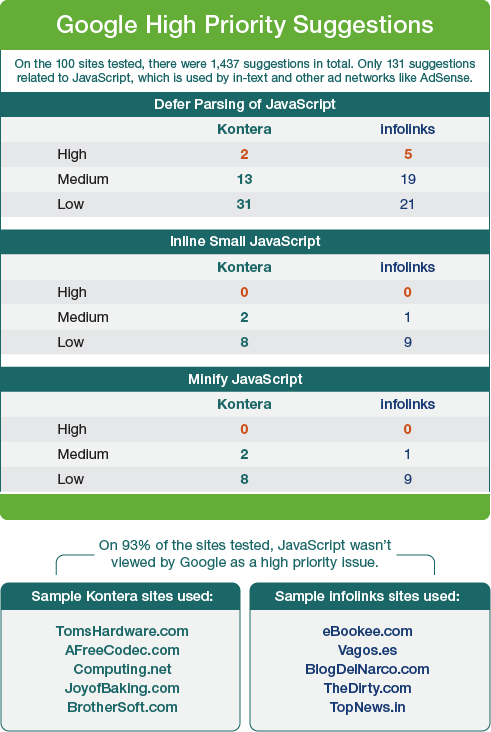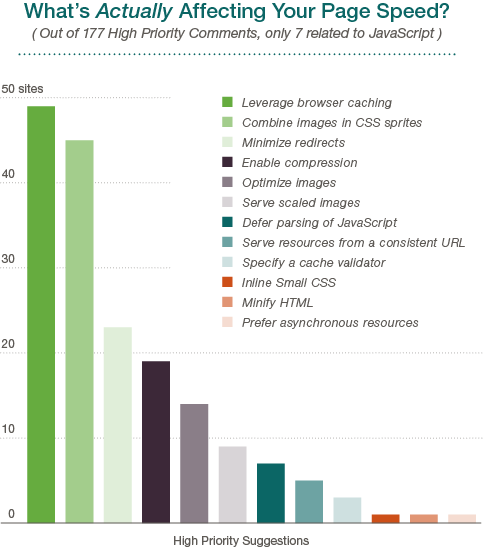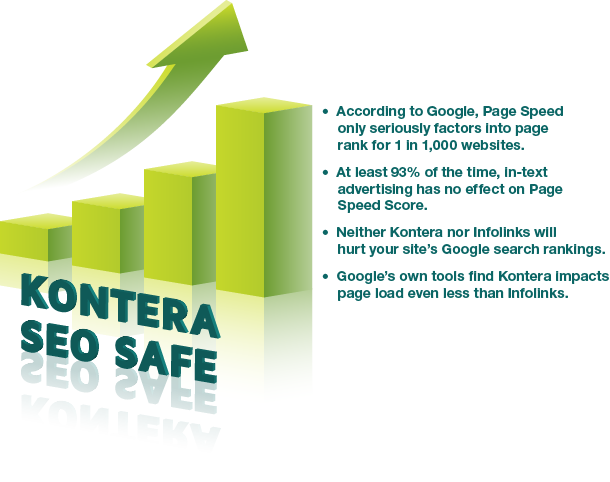It’s no secret that it’s been a pretty stressful year for website publishers. When Google released their Panda update back in March, many sites lost as much as half of their organic traffic overnight, without any idea what they were doing wrong. In the last 9 months we’ve learned a lot about post Panda SEO, but one area that continues to be misunderstood is the issue of page speed, specifically as it relates to In-Text advertising.
Recently my friend John Chow published a post making the claim that the in-text network Infolinks will help your page rank, while using Kontera will hurt your page rank. Not sure how two in-text networks could produce such wildly different results; I decided to replicate John’s data on a larger scale and do some additional research. Using Google’s official Speed Test Tool, which assigns each website a speed score and reveals what elements of a page are slowing down your site, I tested 100 sites that use either Infolinks or Kontera.
Here are my top level findings:
– According to Google’s Matt Cutts, Page Speed only seriously factors into page rank for 1 in 1,000 websites.
– At least 93% of the time in-text advertising has no effect on Page Speed score.
– Neither Kontera nor Infolinks will hurt your site’s Google search rankings.
– Google’s own tools find Kontera impacts page load even less than Infolinks
Page Speed Research: Infolinks vs. Kontera
I took the top 50 sites on Infolinks according to Alexa.com Rank and compared their Google Speed Test Tool scores against 50 top sites using Kontera. Google’s Page Speed Score indicates how much faster a site could be, so the closer a page is to 100, the closer it to being fully optimized. With that in mind, the Kontera sites averaged a test score of 84.7 while the Infolinks sites actually had a slightly lower average score at 81.8.
Additionally, I reviewed all of the specific suggestions that could relate to in-text advertising to understand the impact of the code. The Google Speed Test Tool offers specific suggestions on how to improve your page speed, and then ranks them by priority. High Priority suggestions represent the largest potential performance improvements relative to the least development effort. Medium Priority suggestions will either have less impact or will take more development work. Low Priority tips will have little to no impact on your page speed and should only be tackled when you’ve addressed absolutely everything else.
Here’s how the two technologies scored:

The data shows some striking conclusions. While Google is taking note of the JavaScript code on your page, they don’t seem concerned by it. Even assuming that Kontera and Infolinks are the only JavaScript on these websites (they’re not as AdSense also uses JavaScript), its overall impact is small and most recommendations are considered lower priority. Specifically, “inline small JavaScript” or “Minify JavaScript” was never viewed as an action that would have any significant effect on your page speed. This became obvious when even on sites with very little content and ads, where small changes can have a comparatively large effect, these suggestions still weren’t listed as High Priority.
“Defer parsing of JavaScript” was listed as a High Priority on only 4% of the sites using Kontera and 10% of the sites using Infolinks. In these cases, you may see a slight improvement to your page speed by implementing the suggestion. I asked Kontera about this, and discovered that if you want you can get a unique tag that will even take care of this issue. Simply e-mail their support at [email protected] or contact your account manager.
The Problem with John Chow’s Research
When John did his original post, he did an apple to orange comparison between his web-monetization and SEO website, which uses Infolinks, and Gayot.com, a restaurant guide and culinary reviews website that uses Kontera. While the end scores are not that far apart, John Chow’s website scores an 86 on the Google Speed test compared to a 72 for Gayot.com; John then proclaimed that Infolinks is 50 times faster than Kontera.
That claim sounded a little bit silly, and looking at a much larger pool of data, it’s frankly incorrect. Using the same Google Speed Test Tool top publishers using Kontera had a higher average site score, 84.7 to a score of 81.8 for sites using Infolinks. “Defer parsing of JavaScript” only came up as a High Priority suggestion for 2 Kontera sites, compared to 5 Infolinks sites. John Chow might think Infolinks is the faster network, but Google thinks Kontera is.
However, while it does appear that Kontera is slightly faster, John misrepresented the importance of “Defer parsing of JavaScript” to page speed. In his original article, he linked to an official Google post addressing the subject, but if you look closely at the link it’s actually talking exclusively about the need for parsing on mobile devices, due to their limited CPU capabilities. Kontera automatically uses a mobile optimized layer when accessed from smart phones, so this is not a problem.
If In-Text isn’t hurting your Page Speed, what is slowing your site?

On the 100 sites tested, there were 177 High Priority suggestions and only 7 of them related to JavaScript and In-Text. The far more frequent recommendations were “Leverage browser caching” which showed up as a High Priority suggestion on 49 sites, and “Combine images into CSS sprites” which was a suggestion for 45 sites. Additionally, “Minimize redirects” came up 23 times, “Enable Compression” 19, and “Optimize images” was a High Priority suggestion for 14 sites.
All of these tips are easy to implement and are clearly viewed by Google as much more important to improving your page speed. The Google Speed Test Tool is a great resource, and I fully recommend utilizing it for more tips on what you can do to optimize your own website.
Google’s Position on Page Speed
Since Google officially started counting page speed towards search ranking in April 2010, there’s been a lot of uncertainty about how much that’s actually affecting publishers. In a recent YouTube video, Google executive Matt Cutts finally shed some light on the issue:
“…One thing to bear in mind, however, is that only something like 1 out of 100 searches is site speed such a factor that it would actually change the rankings to a noticeable degree.
“So that’s something on the order of one in 1,000 sites have truly site speed as a really big issue for them. It’s always good to see if you can move a little bit faster and try to return results to users a little bit faster. It makes your website experience more fluid. It makes your users happier. There are studies that say the return on investment is definitely worth it. But at the same time, I wouldn’t stress overly about it.”
Again, only 0.1% of sites (1 in every 1,000) actually have a significant page speed problem. This means that if you follow even the bare minimum best practices for publishers regarding page speed, your search rankings will remain unaffected. As Matt said, page speed is still very important for things like user experience and conversion rates, but in terms of page rank, it’s not going to make a difference one way or the other. Additionally, Kontera and most in-text networks only start loading on a page after everything else, meaning nothing is compromised from a user experience perspective.
Conclusions
After examining all the evidence, I can confidently say that Kontera is NOT going to affect your Google page rank. Infolinks appears to be slightly slower, but neither Infolinks nor likely any other in-text advertising network will impact your Google page rank. Matt Cutts made it clear that page speed is only going to factor into page rank in extreme cases. Our own study validates this and indicates that even if in-text minimally impacts your page speed score, it happens only a very small percentage of the time.
Disclosure: My firm, Influence People, does blogger relations for INTENTclick, which is a Kontera Network. John Chow has a similar business relationship with Infolinks.

